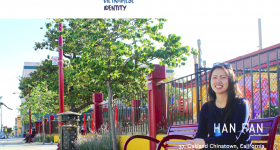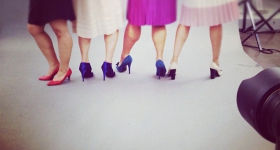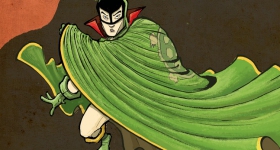YUL KWON and Robin Sukhadia took atypical approaches to life, and both had victories in 2006 that led to profound changes.
Before Yul gained fame and $1 million by winning the CBS reality show Survivor, he worked at Google and was a lawyer and a clerk for a US senator, among other jobs. But more than anything, I knew him as a loyal friend.
We met in high school in Walnut Creek, CA, and have remained friends through college at Stanford University and on until today. Yul has proved time and time again that he puts his personal relationships above all else. Yul has been involved with the Asian American Donor Program since our close friend Evan Chen died from leukemia the summer before our senior year in college.
Robin says winning Mr. Hyphen to become the "Sexiest Asian Male Activist Alive" made him more aware how important it is to be a representative of the Asian American community.
Like Yul, Robin is a man who wears many hats: a former consultant for Accenture, he is now a professional tabla musician, with a master's degree in world music from California Institute of the Arts.
Robin believes in the healing power of music, and he contributes his time to bringing music to young people as international grants director for Project Ahimsa, which helps empower youth in impoverished areas through music. Robin travels to India regularly to develop Project Ahimsa's programs.
I moderated a discussion with Yul and Robin about family, what it means to be Asian American today and the celebrity that comes with winning a reality TV show contest. Here's an excerpt:
You both were in more conventional, "upstanding Asian citizen" type jobs-so you [Yul] were in law, and you [Robin] were at Accenture as a consultant.
YUL: I was a consultant, too.
Right, exactly. And now you're both following less conventional paths, so I'm curious: How did your parents react? How did your friends react? How did the Asian community react?
Y: Well, my dad was mortified.
With the whole Survivor thing you mean?
Y: Yeah. 'We came to this country, worked our asses off, and what are you doing? You're throwing your career away; you're going to embarrass us.'
[laughter]
Bring shame to the family?
Y: Yeah. And I've had a scattershot career path, where I've gone from job to job, and every time I've switched he's been a little bit more concerned, a little bit more disapproving. I finally just went off the deep end, going on a reality show. 'How did I raise you this way?'
So he was really angry, huh?
Y: He was really concerned. He also fundamentally misunderstood the premise of Survivor. He thought it was literally about survival. So he thought, 20 people on an island, the one who got out alive would win.
[laughter]
That would be quite a show.
YUL: He didn't understand why I would want to do it. My mom was a little bit more supportive, because she thought it was exciting, and I think she was also hoping that the exposure would help me find a wife.
ROBIN: For me, being a musician, working with [Project] Ahimsa and having these opportunities to really flex ideas that I have, and things I want to do with my creative side, is why I'm choosing this path. It really came down to that, and for my parents, that's really confusing. The concept of a job has changed so much for them, and even my parents. My dad is a life insurance agent. He does great, great work, and I'm really proud of all the changes that he's made. But for him, when he sees that I'm studying music-and he's a music lover, but he's never had to make that a professional path-it's kind of scary to him. It's so interesting that in the Asian community, our parents are consumed with those two things: What's your job and who's your partner. Those things fit into very, very narrow compartments. It has to be a girlfriend, or you're getting married. There are so many things our generation is facing because of the limitless possibilities we have in this country. And I keep telling my parents: This is why you brought us here ... do you want us to take advantage of what America has to offer?
What opportunities have you been given, and what do you think you'll be doing with them?
Y: One thing I've become more appreciative and cognizant of is the power this platform provides me; just being a public figure who has a lot of recognition, I have a lot more leverage to get things accomplished. I'd like to continue doing things that will help change perceptions of minority groups in this country, particularly Asian American men. And I'd like to do something that keeps me in the spotlight so I can use that as a platform for raising awareness on issues that I care about and service the Asian American community, doing a lot of things that would be difficult without having that celebrity or quasi-celebrity. On the other hand, I don't want to be in the spotlight for the sake of being in the spotlight, so if that doesn't turn out, I'd probably go back to maybe something in the corporate world, but I don't think so. My passion has always been doing something that helps the community, probably with more of a nonprofit angle to it, so I've always been involved in and interested in politics. I'll probably be helping out Obama on his campaign.
And what about you, Robin, after you won Mr. Hyphen, how has that changed your viewpoint? And are you aware of being a representative, of being a member of the community, more than you were before?
R: Definitely. I have to say, honestly, being involved with Hyphen and particularly Mr. Hyphen, this idea of being a member of the Pan-Asian community was something new for me. I'd been working as a South Asian activist and doing all this stuff in India and everything for years before I got involved with this thing, but once that title came, it gave me a platform to do exactly what [YuI] is saying. Not to the level of Survivor, but certainly within this community-that we need to address these kinds of issues, getting people politically involved.
Didn't [Survivor host] Jeff Probst say, "I didn't know before that they [Asian ethnicities] were all different"? I thought, God, I can't believe that.
R: You've got to put that seed into people's minds. Nobody's done that up till now. There's no one discussing that. So in that sense, Survivor did a good job by forcing this contrived thing upon you guys.
Y: I was actually disappointed there weren't more opportunities afterward. They made such a big deal about the racial divide.
They did, and then it sort of faded away like that.
Y: I was hoping that at the end there might be more opportunities to talk about this issue. I felt we had a very compelling story of an underdog tribe made up of different ethnicities, who overcame their individual differences, stuck together and defeated a much larger adversary. It's too small a sample size to draw a general conclusion, but it's a great story.
[Survivor's race teams] became a gimmick, basically. That's all it was?
R: I think it raised the ratings. A lot of people were like, This is so weird, I can't believe this. Let's watch the show.' But in the end I thought the message was great.
Y: One thing I do like is that they do seem committed to having more diversity on the show. This season they did away with the whole racial thing. But they just have a lot more minorities, and I'm glad to see they have more positive African American males, because Survivor has been criticized in the past for not having positive black male role models. And our season, I think that's true.
What do you guys think are the most important issues facing the Asian American community right now, and what do you hope people will get more involved in?
R: I'd say it's immigration. I think this whole discussion about illegal immigration has been focused on the Latino community, and the protests on the streets have featured Latinos. Where are the Asians? Basically after Canada my dad's dream was to come to America-we snuck over the border and lived in a hotel; we were illegal for a good four or five years. Luckily Reagan, at the end of his administration, passed an amnesty bill and that enabled a lot of immigrants to qualify and we were some of those people. But I don't see a lot of South Asians talking about, 'Hey, we need to get in the streets with the rest of these people and talk about the importance of immigration in this country.' I think that's a major issue for Asian Americans, and our community as a Pan-Asian group. We need to talk about immigration, because we benefited from that. [Another] one is what I talked about, the idea of creativity. I think we need to encourage creative paths in young people in the Asian American community and think about it in terms of what's going to happen for our aging parents. How to encourage creativity for them, so that growing older this country isn't as scary for them.
Y: I basically echo the same thoughts. I think immigration is probably the biggest political issue facing the Asian American community as a whole. Apart from that, I think Asian Americans have achieved a lot of success in business and technology, but that's not reflected in the political sphere.
We're too quiet.
Y: We are too quiet. So we need to be supportive of others in the community, help others achieve success, and at the same time try to not be self-segregating, in your own community. I think in order to really change the status quo, you have to achieve a position of influence within the existing power structures. I think we're always on the outside, just criticizing the power structure and not working within it. It's too easy to become marginalized, and in that way we can never achieve sustainable change, unless at some point you get a critical mass to. But that's hard. So we as a community need to encourage more people of our community to achieve mainstream success, whether it's in politics, supporting Asian American candidates, or people in entertainment. At the same time, those people have to make sure they retain close enough ties to the community to create other opportunities for those coming after them. In entertainment, one thing I've heard is that for a lot of Asian American entertainers, media figures, once they cross over.
They just don't care?
Y: They're afraid of being pigeonholed as Asian American actors or entertainers; they just don't want to have anything to do with it. And that's a shame, because they're the ones who have an opportunity to create sustainable change, to open doors for other people in the community. But at the same time, I don't think they can just operate in their own community as well. I think Asian Americans as a whole tend to be a little bit too self-segregating, to stay only within their own community and not bother with the external audience.
[pause]
Y: Is it time for the nude photos?
[laughter]
JANE LIAW ("Asian American Manpower") grew up in Walnut Creek, CA and Singapore, and considers herself as much a citizen of the world as an Asian American. With a background in environmental health, she is now beginning a career as a science writer. She likes festivals of all kinds, cats and Cheeseboard Pizza.









Comments